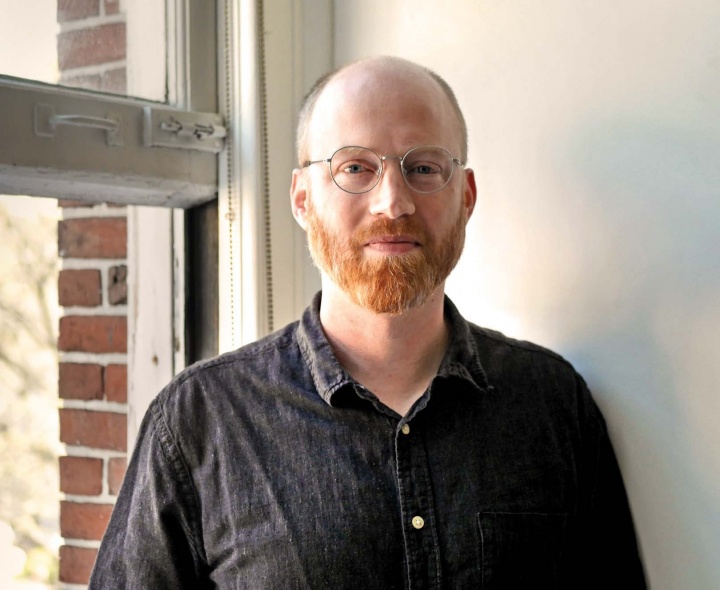Columbia College | Columbia University in the City of New York
Benjamin Steege ’00

Jill Shomer
Steege, an associate professor of music, historical musicology and music theory, recalls teaching Music Hum in Spring 2020, when classes went virtual amidst the outbreak of Covid-19 and trips to live performances were suspended indefinitely. “There were some very moving moments teaching this material online to students who were really scared,” he says. “A lot of them told me they were grateful to just focus on listening to music. They found it reassuring.”
When classes resumed attending performances the following year, Steege was aware that an evening at the opera had new significance. “It became extremely clear that we can no longer take the continuity of the arts for granted,” he says. “I started realizing that what Music Hum is actually about is the survival of art forms.”
Steege says he now tries to impart to students — who have grown up with the ability to download whatever tunes they want — that having centuries of music to study is not a given. “How has music survived? And what is it that we have to do as a society to keep it alive?” he says. “It’s important for the course to ask these big questions.”
Steege joined the faculty in 2012, after earning a Harvard Ph.D. in 2007 and then teaching at Stony Brook University. He was a music major at the College and researched the history of music perception in graduate school. “I was looking at 19th-century physiologists who were figuring out how the ear worked, and were describing how people listen to and understand music alongside the development of the mind sciences,” he says.
He recently finished his first year as Music Hum chair, which he says has largely been a learning stage, spent observing different sections and talking to faculty across the Core Curriculum to see what people are interested in before beginning next year’s syllabus review.
Thinking ahead to that process, Steege would like to see questions about digital media foregrounded. “Students are ready to talk about things like who owns music or what is considered stealing versus borrowing,” he says. “It also feeds into cultural appropriation, which is a theme that instructors are already dealing with. I think there might be ways to make these conversations more programmatic.”
He also thinks there’s room for greater diversity on the syllabus. “We spend half the semester in the 20th century, but it’s a very American 20th century,” he says. “Some of the most exciting places for jazz or classical music right now are not in the Western hemisphere — Seoul, Tokyo, Cape Town, Accra. So I do think it’s important for us to acknowledge a more global perspective.”
A course-wide opera outing has long been a Music Hum tradition; this past semester Steege took 800 students (over three nights) to see a contemporary opera by a Black composer: Terence Blanchard’s 2013 boxing tragedy Champion. “It was a gamble going to something that none of the instructors had seen before, but we thought it was a risk worth taking,” he says. “Blanchard was the first Black composer the Met had ever produced [in 2021], and it allows us to ask questions about the roles of race and representation at a major institution like that.”
Steege played the piano growing up in Massachusetts, but opted not to pursue conservatory or a career in performance. In addition to Music Hum, he also teaches music theory; he enjoys the unexpected in the classroom, “when students at any level have questions you just do not see coming,” he says. “You have to think through your premises carefully and be prepared, sort of on the fly, to rethink them.”
He returns to the subject of Music Hum: “Douglas Moore, the composer who helped create the course in the late 1940s, said something like, ‘Music is a secret language.’ And I think that is fantastically wrong,” Steege says. “Students have a lot of understanding about what music is doing for them, that they maybe just can’t articulate as clearly.
“I think the main thing the class should do is give students the opportunity to shape their thoughts, and give them a sense of confidence in forming judgments about music,” he says. “We’re not trying to teach them, ‘This stuff is great, and you should love it.’”
Issue Contents
Published three times a year by Columbia College for alumni, students, faculty, parents and friends.
Columbia Alumni Center
622 W. 113th St., MC 4530, 6th Fl.
New York, NY 10025
212-851-7852
cct@columbia.edu
Columbia Alumni Center
622 W. 113th St., MC 4530, 4th Fl.
New York, NY 10025
212-851-7488
ccalumni@columbia.edu

